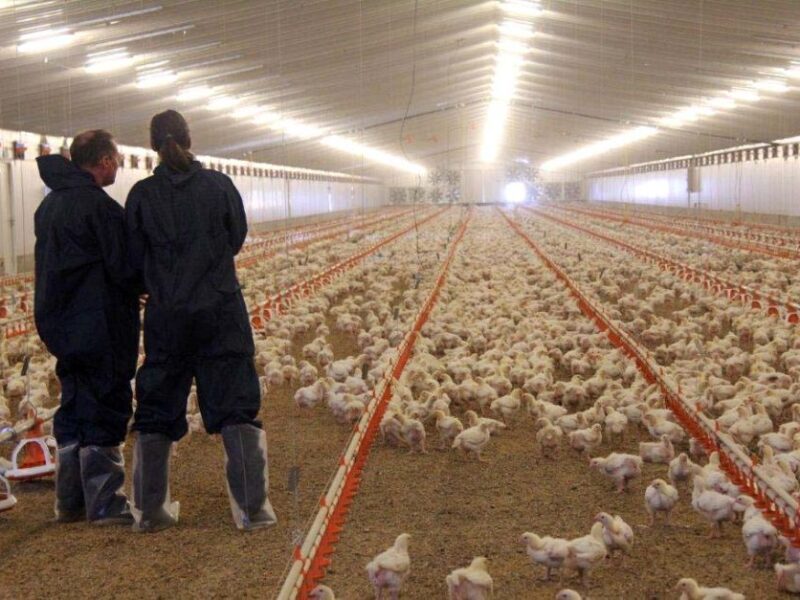Canada’s poultry industry is a vital part of the agricultural sector, providing opportunities for many workers, including immigrants. For those looking to start a new life in Canada, poultry jobs offer a stable income, a chance to learn valuable skills, and the possibility of long-term employment.
This article will explore visa sponsorship options, typical job responsibilities, earning potential, and opportunities for career growth in the poultry sector.
Overview of the Poultry Industry in Canada
The poultry industry is a significant contributor to Canada’s economy, particularly in provinces like Ontario, Quebec, and British Columbia, where farming is a major activity.
Poultry farming includes the production of meat and eggs, with thousands of farms across the country. This industry is growing, driven by increasing demand for poultry products both domestically and internationally.
The expansion of the poultry industry has led to a consistent demand for workers. From farmhands to processing plant workers, the sector offers various job opportunities. This demand makes poultry jobs an attractive option for immigrants seeking employment in Canada.
Visa Sponsorship Options for Poultry Workers
For immigrants aiming to work in Canada’s poultry industry, several visa sponsorship options are available. The most common programs include the Temporary Foreign Worker Program (TFWP) and the Seasonal Agricultural Worker Program (SAWP).
The Temporary Foreign Worker Program (TFWP) allows Canadian employers to hire foreign workers to fill labor shortages, including those in the poultry industry. To qualify, you need to secure a job offer from a Canadian employer who can demonstrate that no Canadian workers are available to fill the position. Once the job offer is secured, the employer can apply for a Labor Market Impact Assessment (LMIA), which is required for your work permit.
The Seasonal Agricultural Worker Program (SAWP) is another option, specifically designed for agricultural workers. This program allows workers from certain countries to work in Canada on a temporary basis, usually for up to eight months. It’s a good fit for those interested in seasonal work in poultry farming.
Finding employers who offer visa sponsorship can be challenging but not impossible. Job search platforms like Indeed and specialized agricultural job boards are good starting points. Networking within immigrant communities and reaching out to recruitment agencies can also help you find suitable job openings.
Typical Responsibilities in Poultry Jobs
Poultry jobs encompass a variety of roles, each with specific responsibilities. Whether you work on a farm or in a processing plant, you’ll be involved in tasks essential to poultry production.
On farms, farmhands are responsible for feeding and caring for poultry, collecting eggs, cleaning barns, and maintaining equipment. You’ll also be involved in monitoring the health of the birds, ensuring they are free from disease and well-cared for.
In processing plants, workers handle tasks such as slaughtering, packaging, and shipping poultry products. This work is more physically demanding and requires strict adherence to health and safety regulations to ensure the quality and safety of the food products.
Regardless of the specific role, working in the poultry industry requires attention to detail, the ability to work in a team, and a willingness to perform repetitive tasks. It’s a job that demands physical stamina, as you may spend long hours on your feet and handle heavy equipment or large numbers of birds.
Earnings Potential for Poultry Workers in Canada
Poultry jobs in Canada offer competitive wages, especially considering the entry-level nature of many positions. The average salary for poultry workers ranges from $15 to $20 per hour, depending on the specific role, location, and your experience level.
For example, farmhands and processing plant workers typically earn between $30,000 and $40,000 per year, with the potential for overtime pay during peak seasons. More specialized roles, such as supervisors or those with additional certifications, can earn upwards of $45,000 to $50,000 per year.
Wages can vary significantly based on the province. For instance, workers in provinces like Ontario and British Columbia, where the cost of living is higher, may earn more than those in rural areas or less economically developed regions.
Opportunities for Career Growth in the Poultry Industry
While many start in entry-level positions, the poultry industry offers pathways for career advancement. With experience, you can move into supervisory roles, overseeing teams of workers and managing farm operations. Some may even advance to positions such as farm managers or production supervisors, where they are responsible for the overall operation of a poultry farm or processing facility.
Training and certification programs are available to help workers develop specialized skills, such as animal husbandry or food safety management. These qualifications not only enhance your expertise but also increase your earning potential and job security.
Moreover, the skills you acquire in the poultry industry, such as teamwork, attention to detail, and equipment maintenance, are transferable to other sectors of agriculture or even food production, opening up further career opportunities.
Challenges Faced by Immigrant Poultry Workers
Despite the opportunities, immigrant poultry workers may face several challenges. The physical demands of the job can be significant, with long hours, repetitive tasks, and the need to work in sometimes harsh conditions, such as cold processing plants or hot barns.
Language barriers can also pose challenges, especially if you’re not fluent in English or French, Canada’s official languages. Understanding safety protocols, communicating effectively with coworkers, and navigating daily tasks can be more difficult without strong language skills.
Adapting to the Canadian work culture and legal environment is another hurdle. The poultry industry is highly regulated, with strict standards for food safety and animal welfare. Familiarizing yourself with these regulations and ensuring compliance is critical for success in the industry.
How to Apply for Poultry Jobs with Visa Sponsorship
Applying for poultry jobs with visa sponsorship in Canada involves several steps. First, you’ll need to search for job openings that specifically mention visa sponsorship. Websites like Job Bank Canada, Indeed, and industry-specific job boards are good places to start.
Once you find suitable positions, tailor your resume and cover letter to highlight your relevant experience, such as previous work in agriculture or food production. Emphasize any skills that are directly applicable to the job, such as equipment operation or knowledge of animal care.
After submitting your applications, prepare for interviews by researching the company and understanding the specific requirements of the role. Be ready to discuss your experience, your understanding of the job’s physical demands, and your commitment to complying with Canadian regulations.
If you receive a job offer, your employer will initiate the visa sponsorship process, which involves obtaining an LMIA and submitting your work permit application. Make sure you have all necessary documents ready, including proof of previous work experience, identification, and any certifications.
Conclusion
Poultry jobs in Canada offer a stable and rewarding career path for immigrants, with opportunities for visa sponsorship, competitive earnings, and room for advancement.
While the work can be physically demanding and requires adherence to strict regulations, it provides a valuable entry point into the Canadian workforce.
By understanding the industry, meeting eligibility criteria, and taking proactive steps in your job search, you can build a successful and fulfilling career in Canada’s thriving poultry sector.






